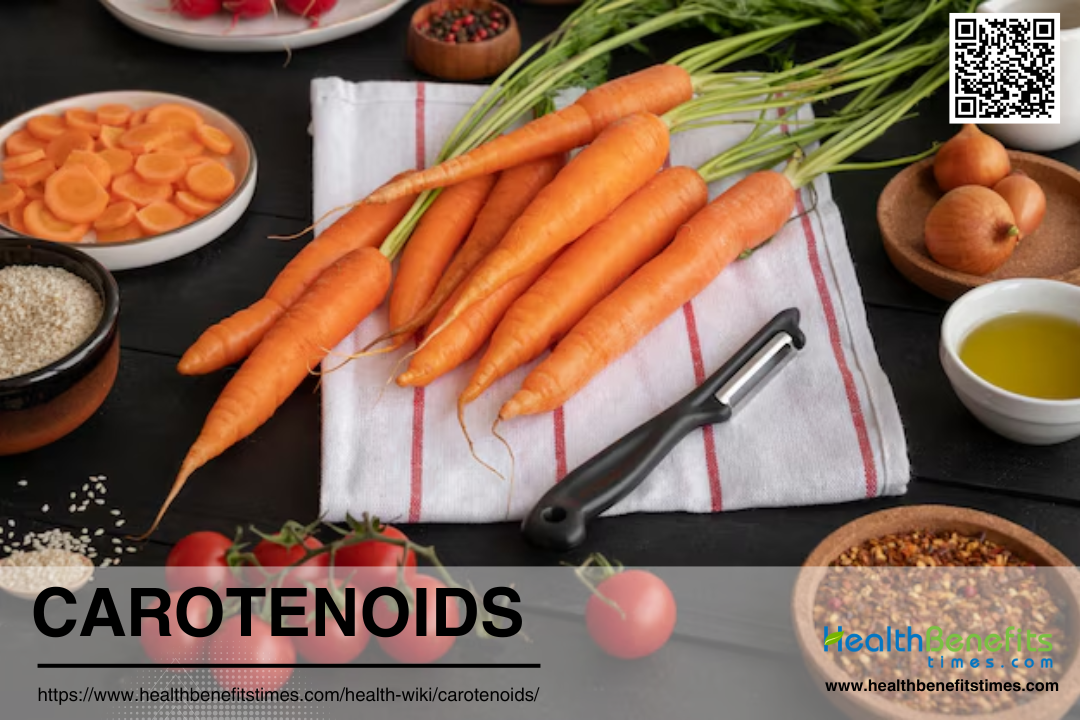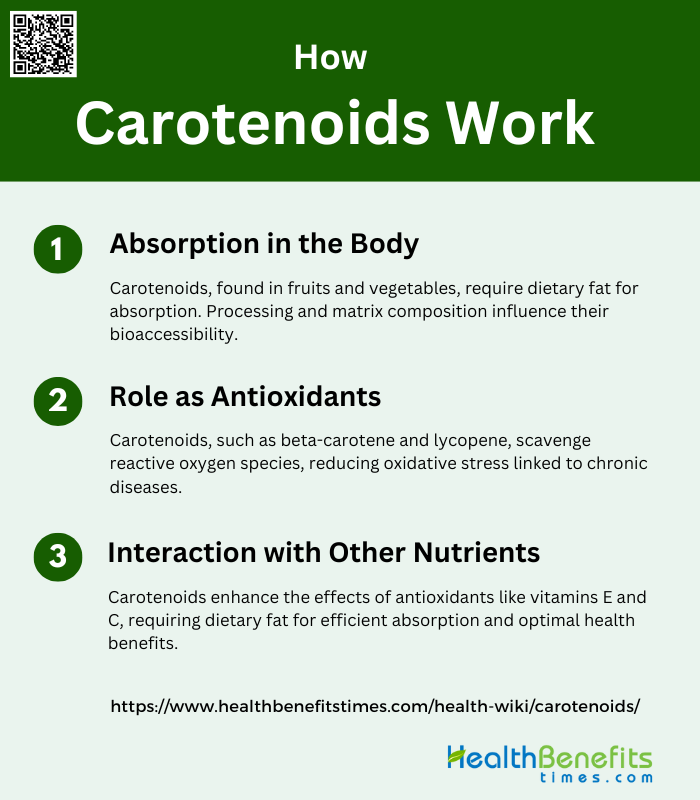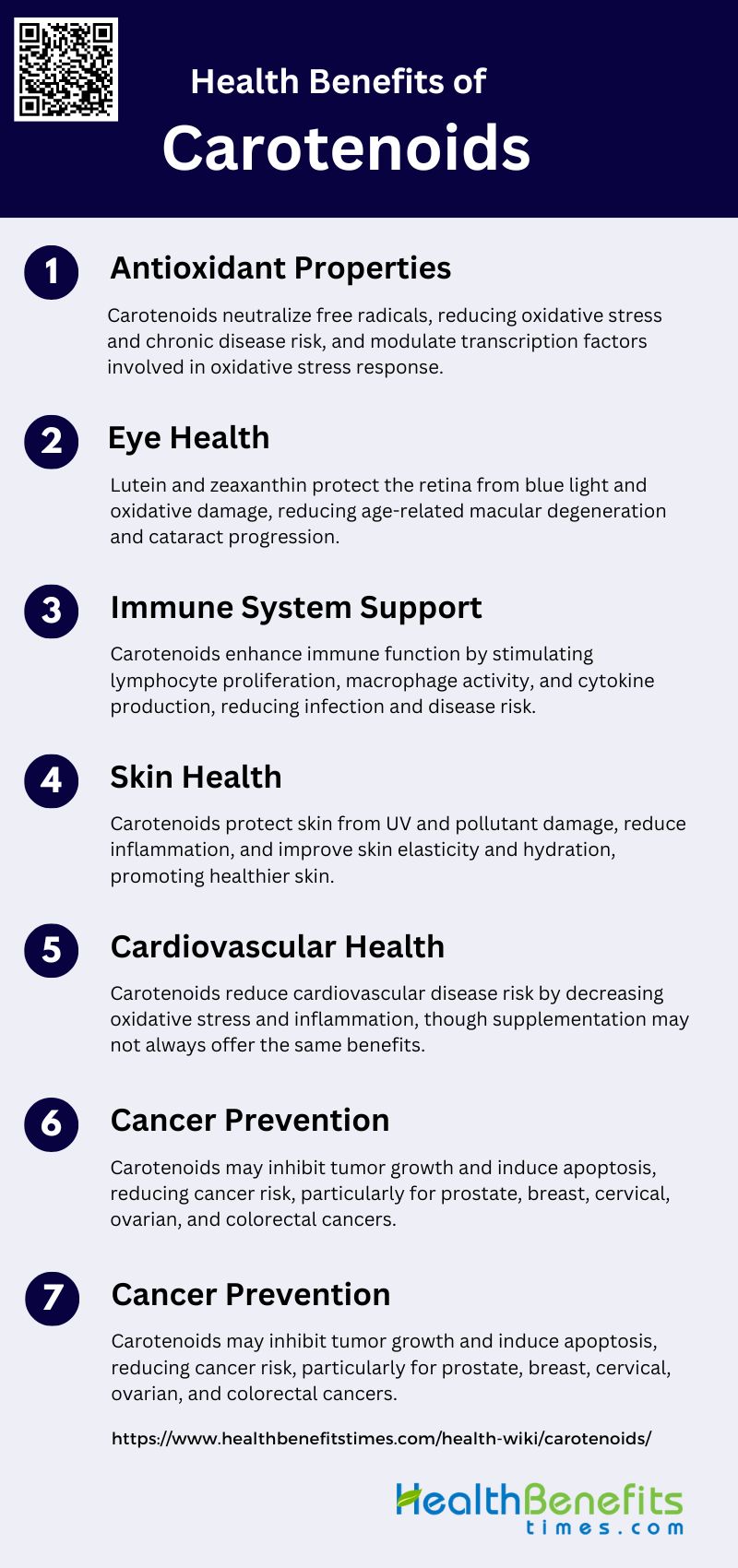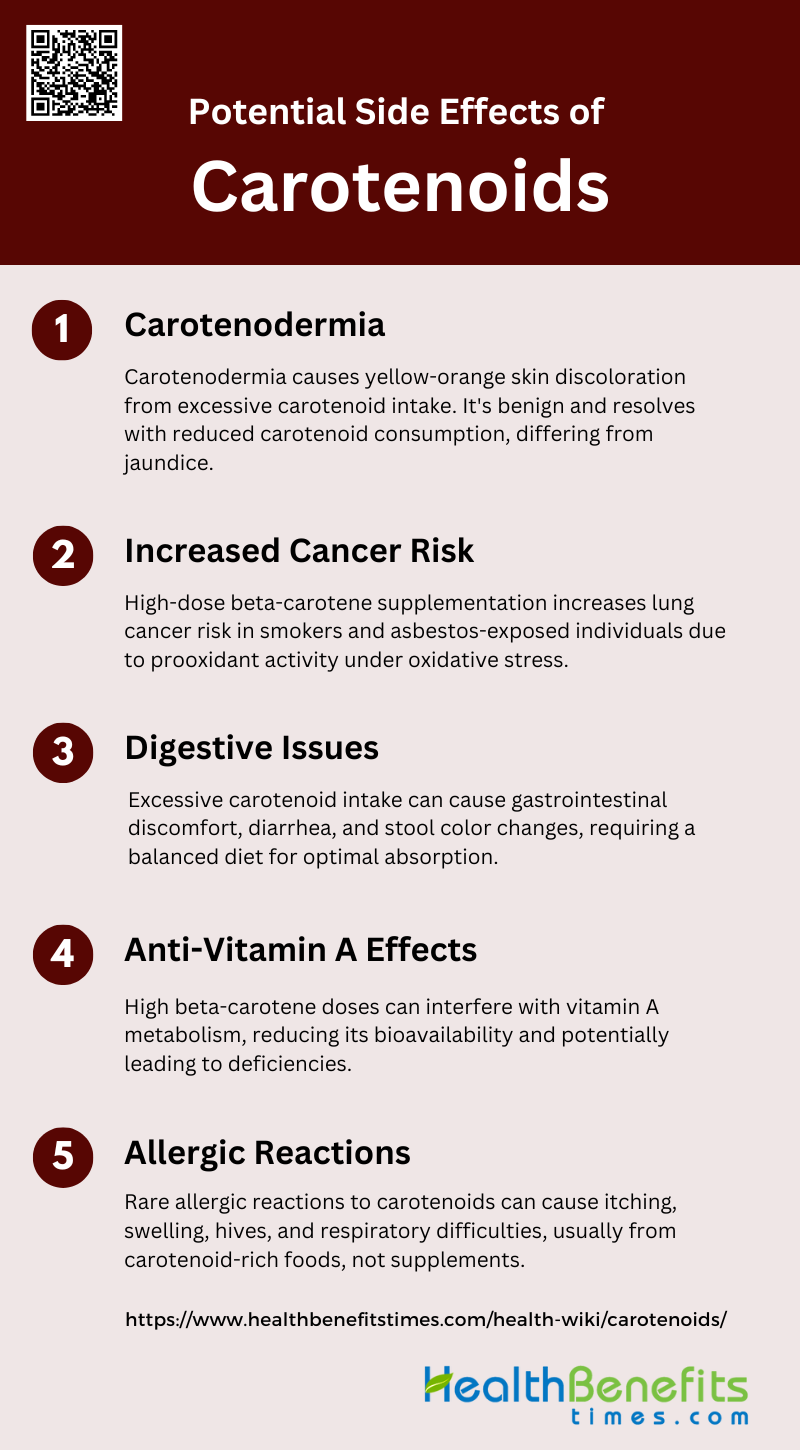Carotenoids are a diverse family of fat-soluble pigments found naturally in plants, algae, some fungi, and certain bacteria. These organic compounds are responsible for the vibrant yellow, orange, and red colors observed in many fruits, vegetables, and other organisms. Structurally, carotenoids are tetraterpenes, typically containing 40 carbon atoms arranged in a chain with various end groups. They can be broadly classified into two main categories: carotenes, which are purely hydrocarbons (e.g., beta-carotene), and xanthophylls, which contain oxygen atoms in their molecular structure (e.g., lutein). Carotenoids play crucial roles in photosynthesis, acting as accessory pigments in light-harvesting complexes and protecting against photo-oxidative damage. In addition to their importance in plant biology, carotenoids serve as precursors to vitamin A in animals and possess antioxidant properties, making them significant in human health and nutrition.
How Carotenoids Work
Carotenoids are powerful organic pigments that play crucial roles in both plant and animal biology. These versatile compounds contribute to various physiological processes and offer numerous health benefits. To understand how carotenoids function, let’s explore their key mechanisms of action:
1. Absorption in the Body
Humans cannot synthesize carotenoids and must obtain them through diet or supplementation. The bioaccessibility of carotenoids, which refers to the amount released from food during digestion, is generally low and is affected by food processing and matrix composition. For instance, homogenization and thermal treatment can enhance bioaccessibility, while dietary fiber can inhibit it. Additionally, the presence of dietary fat is crucial for carotenoid absorption, as it facilitates their incorporation into micelles during digestion. This is one reason why diets rich in healthy fats, such as the Mediterranean diet, are beneficial for carotenoid absorption.
2. Role as Antioxidants
Carotenoids play a significant role as antioxidants by scavenging reactive oxygen species (ROS) and singlet molecular oxygen, thereby protecting cells from oxidative damage. They interact synergistically with other antioxidants, such as vitamins E and C, enhancing their overall effectiveness. Carotenoids like beta-carotene, lycopene, lutein, and zeaxanthin are particularly effective in lipid phases, where they quench singlet oxygen and free radicals. This antioxidant activity is crucial in reducing oxidative stress, which is linked to various chronic diseases, including cancer, cardiovascular diseases, and age-related macular degeneration. However, at high concentrations or under certain conditions, carotenoids may lose their antioxidant effectiveness.
3. Interaction with Other Nutrients
Carotenoids interact with other nutrients, particularly antioxidants like vitamins E and C, to enhance their protective effects against oxidative stress. Vitamin E, for example, is a major peroxyl radical scavenger in biological membranes, while vitamin C can regenerate oxidized vitamin E, thereby maintaining its antioxidant capacity. This synergistic interaction is essential for the effective functioning of the body’s antioxidant defense system. Additionally, the presence of dietary fat is necessary for the efficient absorption of carotenoids, as it aids in their incorporation into micelles during digestion. This interplay between carotenoids and other nutrients underscores the importance of a balanced diet for optimal health benefits.
Types of carotenoids
These organic compounds play crucial roles in photosynthesis and offer numerous health benefits when consumed by humans. Carotenoids can be broadly classified into two main categories:
1. Xanthophylls
Xanthophylls are a class of oxygen-containing carotenoids that play crucial roles in various biological processes. They are primarily found in algae, where they assist in photosynthesis and protect against oxidative stress by quenching singlet oxygen damage. Common xanthophylls include lutein, zeaxanthin, astaxanthin, and fucoxanthin, each exhibiting unique health benefits. For instance, lutein and zeaxanthin are known for their protective effects against age-related macular degeneration and other eye diseases. Astaxanthin has demonstrated skin-protecting properties against UV light and anti-allergic activities. These compounds are also studied for their anti-tumor and anti-inflammatory activities, making them valuable in pharmaceutical and nutraceutical applications. Despite their potential, the extraction and purification processes need standardization to enhance their commercial viability.
2. Carotenes
Carotenes are hydrocarbon carotenoids composed solely of carbon and hydrogen atoms. They are synthesized by photosynthetic organisms and are responsible for the orange, yellow, and red colors in various fruits and vegetables. Notable carotenes include α-carotene, β-carotene, and lycopene. β-carotene is a precursor to vitamin A, essential for vision, immune function, and skin health. Carotenes are also potent antioxidants, protecting cells from oxidative stress by neutralizing free radicals. They play a significant role in photosynthesis by capturing light energy and protecting photosynthetic organisms from photooxidative damage. Carotenes are widely used in the food industry as natural colorants and in dietary supplements for their health benefits. Research continues to explore their full potential in disease prevention and health promotion.
Sources of Carotenoids
Carotenoids are essential pigments found in various natural and synthetic sources, contributing significantly to human health and nutrition. They are primarily obtained through diet, with fruits and vegetables being the most common sources. Additionally, synthetic carotenoids are available to supplement dietary intake. Here are the main sources of carotenoids:
1. Natural Food Sources
Carotenoids are naturally occurring pigments found in a variety of fruits and vegetables, contributing to their vibrant colors and offering numerous health benefits. Fruits such as mango, papaya, and pittango are particularly rich in carotenoids, with high concentrations of hydrocarbon carotenes, cryptoxanthins, and xanthophylls. Vegetables like carrots, sweet potatoes, tomatoes, and red peppers are also significant sources, containing a wide range of carotenoids including beta-carotene, lycopene, lutein, and zeaxanthin. These compounds play crucial roles in human health, acting as antioxidants and providing pro-vitamin A activity, which is essential for vision and immune function. The bioavailability and composition of carotenoids in these foods can be influenced by factors such as food processing and post-harvest storage.
2. Synthetic Sources
While natural sources of carotenoids are abundant, synthetic carotenoids also play a significant role in various industries, including food, cosmetics, and pharmaceuticals. Synthetic beta-carotene, for example, is widely used due to its stability and cost-effectiveness. However, there is a growing interest in natural carotenoids due to their diverse isomeric forms and potential health benefits, which synthetic versions may lack. Advances in green extraction methods, such as supercritical CO2 extraction and solvent-free techniques, are making it more feasible to obtain high-purity carotenoids from natural sources, reducing reliance on synthetic alternatives. Despite the convenience of synthetic carotenoids, ongoing research emphasizes the superior health benefits and bioavailability of naturally derived carotenoids.
Health Benefits of Carotenoids
These compounds play a crucial role in maintaining overall health by acting as antioxidants, boosting the immune system, and promoting eye health. Incorporating carotenoid-rich foods into your diet can provide a range of benefits, including:
1. Antioxidant Properties
Carotenoids are renowned for their potent antioxidant properties, which play a crucial role in neutralizing free radicals and reducing oxidative stress. These compounds can quench singlet oxygen and scavenge free radicals, thereby preventing cellular damage and mitigating the risk of chronic diseases. The antioxidant activity of carotenoids is linked to their ability to modulate transcription factors such as NRF2 and NF-κB, which are involved in the cellular response to oxidative stress. This antioxidant capacity is particularly beneficial in preventing age-related pathologies and some types of cancers.
2. Eye Health
Carotenoids, particularly lutein and zeaxanthin, are essential for maintaining eye health. These compounds constitute the macular pigment in the eye and are known to absorb damaging blue light, thereby protecting the retina from oxidative damage. Studies have shown that lutein and zeaxanthin can reduce the progression of age-related macular degeneration and cataracts, making them crucial for preventing age-related eye diseases. The consumption of foods rich in these carotenoids or their supplementation is recommended to support eye health.
3. Immune System Support
Carotenoid plays a significant role in supporting the immune system. They can modulate immune responses by affecting cell growth and gene expression. Carotenoids stimulate the proliferation of B- and T-lymphocytes, enhance the activity of macrophages and cytotoxic T-cells, and increase the production of cytokines. These immune-boosting properties help in maintaining overall health and reducing the risk of infections and diseases related to low immune function. The intake of carotenoid-rich foods is thus beneficial for enhancing immune system performance.
4. Skin Health
The antioxidant properties of carotenoids extend to skin health, where they help protect the skin from oxidative damage caused by UV radiation and environmental pollutants. Carotenoids such as astaxanthin have been shown to improve skin condition by reducing inflammation, preventing cell death, and regulating lipid metabolism. These compounds can also enhance skin elasticity and hydration, making them valuable in the cosmetic industry. Regular consumption of carotenoid-rich foods or supplements can thus contribute to healthier, more resilient skin.
5. Cardiovascular Health
Carotenoids have been associated with a reduced risk of cardiovascular diseases (CVD). Their antioxidant properties help in reducing oxidative stress and inflammation, which are key factors in the development of CVD. Epidemiological studies have shown that a high intake of carotenoids is linked to lower incidences of heart diseases. However, it is important to note that while dietary intake of carotenoids is beneficial, supplementation with isolated carotenoids like β-carotene has not consistently shown the same benefits and may even increase the risk of lung cancer in smokers.
6. Cancer Prevention
They can inhibit malignant tumor growth and induce apoptosis, thereby reducing the risk of various cancers such as breast, cervical, ovarian, and colorectal cancers. The mechanisms involved include effects on gap junctional intercellular communication, growth factor signaling, and the modulation of inflammatory cytokines. Lycopene, in particular, has been noted for its role in reducing prostate cancer progression. Despite these promising findings, more research is needed to confirm the efficacy and safety of carotenoid supplementation in cancer prevention.
7. Cognitive Function
Emerging evidence suggests that carotenoids may also benefit cognitive function. Their antioxidant and anti-inflammatory properties help protect brain cells from oxidative damage and inflammation, which are linked to cognitive decline and neurodegenerative diseases. Lutein and zeaxanthin, in particular, have been associated with improved cognitive performance and a reduced risk of age-related cognitive decline. While the current research is promising, further studies are needed to fully understand the impact of carotenoids on cognitive health and to establish dietary recommendations.
Daily recommended amounts of Carotenoids
The recommended daily intake of carotenoids varies depending on the specific type and the guidelines of different health organizations. For beta-carotene, the German Nutrition Society (DGE) recommends an intake of 2 mg per day, in addition to 1.0 mg of retinol-equivalents for vitamin A requirements, while the National Cancer Institute (NCI) in the USA suggests a higher intake of 5-6 mg per day. In general, the adequate level of daily carotenoid intake is considered to be around 15 mg, with specific recommendations of 5 mg each for beta-carotene, lycopene, and lutein. To achieve these recommended levels, a diet rich in fruits and vegetables is essential. For instance, consuming 100-200 grams of vegetables and fruits with high carotenoid content, such as kale, red peppers, spinach, and carrots, can help meet these requirements. Additionally, epidemiological studies have shown that higher carotenoid intake is associated with a reduced risk of chronic diseases, including cardiovascular disease, diabetes, and certain cancers. Therefore, incorporating a variety of carotenoid-rich foods into the daily diet is beneficial for overall health.
Potential Side Effects of Carotenoids
Carotenoids, while beneficial for health, can also have potential side effects when consumed in excessive amounts. These naturally occurring pigments, found in many fruits and vegetables, may lead to skin discoloration, digestive issues, and other health concerns if not taken in moderation. It is important to be aware of these potential side effects, which include:
1. Carotenodermia
Carotenodermia is a benign condition characterized by yellow-orange discoloration of the skin, primarily resulting from excessive consumption of carotenoid-rich foods or supplements. This condition occurs because carotenoids, such as beta-carotene, are deposited in the outermost layer of the skin. While carotenodermia is not harmful and typically resolves with reduced intake of carotenoids, it can be cosmetically concerning for some individuals. The condition is more noticeable in areas with thicker skin, such as the palms and soles. It is important to distinguish carotenodermia from jaundice, which also causes yellowing of the skin but is associated with liver dysfunction.
2. Increased Cancer Risk
High-dose carotenoid supplementation, particularly beta-carotene, has been linked to an increased risk of lung cancer in smokers and individuals exposed to asbestos. This paradoxical effect is thought to arise from the prooxidant activity of carotenoid breakdown products under conditions of oxidative stress. These breakdown products can impair mitochondrial function and promote cellular damage, leading to an elevated cancer risk. Therefore, while carotenoids have antioxidant properties, their supplementation in high doses should be approached with caution, especially in populations at risk for lung cancer.
3. Digestive Issues
Excessive intake of carotenoids can lead to digestive issues, including gastrointestinal discomfort, diarrhea, and changes in stool color. These side effects are generally mild and occur because carotenoids are lipophilic compounds that require fat for proper absorption. When consumed in large quantities, they can overwhelm the digestive system, leading to malabsorption and gastrointestinal symptoms. It is essential to balance carotenoid intake with other dietary components to minimize these adverse effects and ensure optimal nutrient absorption.
4. Anti-Vitamin A Effects
High doses of certain carotenoids, such as beta-carotene, can interfere with the metabolism of vitamin A, leading to potential anti-vitamin A effects. This interference occurs because beta-carotene competes with other forms of vitamin A for absorption and conversion in the body. Consequently, excessive beta-carotene intake can reduce the bioavailability of preformed vitamin A, potentially leading to deficiencies. It is crucial to monitor carotenoid supplementation to avoid disrupting the delicate balance of vitamin A metabolism and ensure adequate nutritional status.
5. Allergic Reactions
Although rare, allergic reactions to carotenoids can occur, particularly in individuals with sensitivities to certain fruits and vegetables. Symptoms of an allergic reaction may include itching, swelling, hives, and respiratory difficulties. These reactions are typically associated with the consumption of carotenoid-rich foods rather than supplements. Individuals with known food allergies should be cautious when increasing their intake of carotenoids and consult with a healthcare provider if they experience any adverse symptoms.





